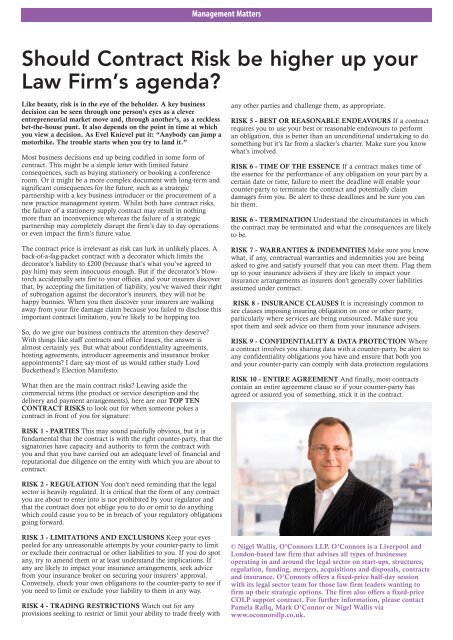Liverpool Law Aug 2017
Create successful ePaper yourself
Turn your PDF publications into a flip-book with our unique Google optimized e-Paper software.
Management Matters<br />
Should Contract Risk be higher up your<br />
<strong>Law</strong> Firm’s agenda?<br />
Like beauty, risk is in the eye of the beholder. A key business<br />
decision can be seen through one person’s eyes as a clever<br />
entrepreneurial market move and, through another’s, as a reckless<br />
bet-the-house punt. It also depends on the point in time at which<br />
you view a decision. As Evel Knievel put it: “Anybody can jump a<br />
motorbike. The trouble starts when you try to land it.”<br />
Most business decisions end up being codified in some form of<br />
contract. This might be a simple letter with limited future<br />
consequences, such as buying stationery or booking a conference<br />
room. Or it might be a more complex document with long-term and<br />
significant consequences for the future, such as a strategic<br />
partnership with a key business introducer or the procurement of a<br />
new practice management system. Whilst both have contract risks,<br />
the failure of a stationery supply contract may result in nothing<br />
more than an inconvenience whereas the failure of a strategic<br />
partnership may completely disrupt the firm’s day to day operations<br />
or even impact the firm’s future value.<br />
any other parties and challenge them, as appropriate.<br />
RISK 5 - BEST OR REASONABLE ENDEAVOURS If a contract<br />
requires you to use your best or reasonable endeavours to perform<br />
an obligation, this is better than an unconditional undertaking to do<br />
something but it’s far from a slacker’s charter. Make sure you know<br />
what’s involved.<br />
RISK 6 - TIME OF THE ESSENCE If a contract makes time of<br />
the essence for the performance of any obligation on your part by a<br />
certain date or time, failure to meet the deadline will enable your<br />
counter-party to terminate the contract and potentially claim<br />
damages from you. Be alert to these deadlines and be sure you can<br />
hit them.<br />
RISK 6 - TERMINATION Understand the circumstances in which<br />
the contract may be terminated and what the consequences are likely<br />
to be.<br />
The contract price is irrelevant as risk can lurk in unlikely places. A<br />
back-of-a-fag-packet contract with a decorator which limits the<br />
decorator’s liability to £200 (because that’s what you’ve agreed to<br />
pay him) may seem innocuous enough. But if the decorator’s blowtorch<br />
accidentally sets fire to your offices, and your insurers discover<br />
that, by accepting the limitation of liability, you’ve waived their right<br />
of subrogation against the decorator’s insurers, they will not be<br />
happy bunnies. When you then discover your insurers are walking<br />
away from your fire damage claim because you failed to disclose this<br />
important contract limitation, you’re likely to be hopping too.<br />
So, do we give our business contracts the attention they deserve?<br />
With things like staff contracts and office leases, the answer is<br />
almost certainly yes. But what about confidentiality agreements,<br />
hosting agreements, introducer agreements and insurance broker<br />
appointments? I dare say most of us would rather study Lord<br />
Buckethead’s Election Manifesto.<br />
What then are the main contract risks? Leaving aside the<br />
commercial terms (the product or service description and the<br />
delivery and payment arrangements), here are our TOP TEN<br />
CONTRACT RISKS to look out for when someone pokes a<br />
contract in front of you for signature:<br />
RISK 7 - WARRANTIES & INDEMNITIES Make sure you know<br />
what, if any, contractual warranties and indemnities you are being<br />
asked to give and satisfy yourself that you can meet them. Flag them<br />
up to your insurance advisers if they are likely to impact your<br />
insurance arrangements as insurers don’t generally cover liabilities<br />
assumed under contract.<br />
RISK 8 - INSURANCE CLAUSES It is increasingly common to<br />
see clauses imposing insuring obligation on one or other party,<br />
particularly where services are being outsourced. Make sure you<br />
spot them and seek advice on them from your insurance advisers.<br />
RISK 9 - CONFIDENTIALITY & DATA PROTECTION Where<br />
a contract involves you sharing data with a counter-party, be alert to<br />
any confidentiality obligations you have and ensure that both you<br />
and your counter-party can comply with data protection regulations.<br />
RISK 10 - ENTIRE AGREEMENT And finally, most contracts<br />
contain an entire agreement clause so if your counter-party has<br />
agreed or assured you of something, stick it in the contract.<br />
RISK 1 - PARTIES This may sound painfully obvious, but it is<br />
fundamental that the contract is with the right counter-party, that the<br />
signatories have capacity and authority to form the contract with<br />
you and that you have carried out an adequate level of financial and<br />
reputational due diligence on the entity with which you are about to<br />
contract.<br />
RISK 2 - REGULATION You don’t need reminding that the legal<br />
sector is heavily regulated. It is critical that the form of any contract<br />
you are about to enter into is not prohibited by your regulator and<br />
that the contract does not oblige you to do or omit to do anything<br />
which could cause you to be in breach of your regulatory obligations<br />
going forward.<br />
RISK 3 - LIMITATIONS AND EXCLUSIONS Keep your eyes<br />
peeled for any unreasonable attempts by your counter-party to limit<br />
or exclude their contractual or other liabilities to you. If you do spot<br />
any, try to amend them or at least understand the implications. If<br />
any are likely to impact your insurance arrangements, seek advice<br />
from your insurance broker on securing your insurers’ approval.<br />
Conversely, check your own obligations to the counter-party to see if<br />
you need to limit or exclude your liability to them in any way.<br />
RISK 4 - TRADING RESTRICTIONS Watch out for any<br />
provisions seeking to restrict or limit your ability to trade freely with<br />
© Nigel Wallis, O’Connors LLP. O’Connors is a <strong>Liverpool</strong> and<br />
London-based law firm that advises all types of businesses<br />
operating in and around the legal sector on start-ups, structures,<br />
regulation, funding, mergers, acquisitions and disposals, contracts<br />
and insurance. O’Connors offers a fixed-price half-day session<br />
with its legal sector team for those law firm leaders wanting to<br />
firm up their strategic options. The firm also offers a fixed-price<br />
COLP support contract. For further information, please contact<br />
Pamela Rafiq, Mark O’Connor or Nigel Wallis via<br />
www.oconnorsllp.co.uk.

















